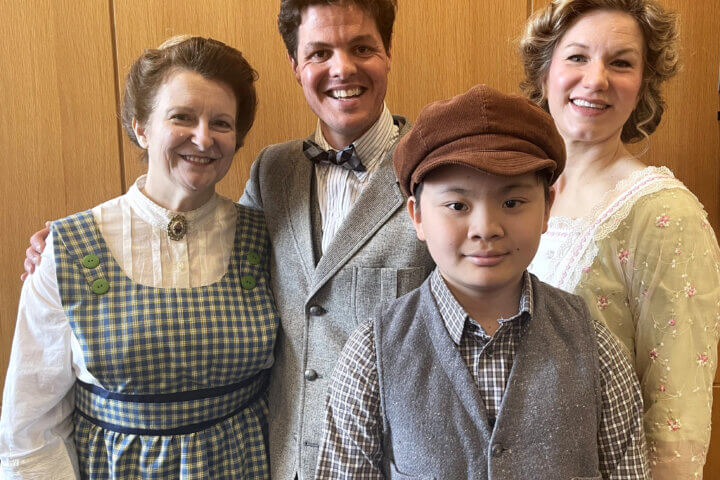While her father was battling Alzheimer’s, Isabelle Schnadig of Concord turned to the things she knew could help both her and her family — art and writing.
The result: A book to help children understand the various stages of dementia and Alzheimer’s, and to “help the adult caregivers to whom I share my experience in an open letter,” she said.
Titled “Grandpa has Alzheimer’s,” the book chronicles the family’s journey as they navigate her father’s debilitating disease.
The writing was cathartic for Schnadig.
“[It was] difficult for all of us to be with him. We wanted so much to be with him, but we felt at times so overwhelmed because his behavior was so different. It took a very long time for my father to completely decline,” she said.
The story, intended for children ages 8 to 10, chronicles the life of Grandpa Norman and Grandma Clarisse — in the voice of their granddaughter — as they confront Norman’s Alzheimer’s diagnosis.
The narrator shares some of the behavior changes she sees in her grandfather, how she is learning to handle them, and her own feelings of loss.
Flights of fancy
In writing about different stages of her father’s life in the book, Schnadig shares some favorite anecdotes.
Over time, the stories he told became more fanciful.
“There were … times when he was completely in the past and trying to repeat stories that happened to him when he was little,” she said.
As he got sicker, the stories became more “absurd.”
He told Schnadig he had traveled a lot as a young man, when in fact he had not. At one point, he said he had taken his coffee on the wing of an airplane and remembered feeling very cold, a story Schnadig shares in the book, along with an illustration.
“He really believed that,” she said.
A long journey
Schnadig began the writing while her father was still alive. He died December 29, 2021. The book was published in 2023.
After her mother died in 2016, her father lived alone in France, where Schnadig and her two sisters grew up. At the time of their mother’s death, Schnadig and her sisters noticed her father was repeating himself and was often forgetful, but they attributed the lapses to anxiety over their mother’s loss.
When her father was diagnosed with Alzheimer’s, Schnadig initially wanted him to live with her and her family. But with four children — one with special needs — she and her husband decided it would be too difficult for them to care for him.
“It’s also not fair for the person with the disease,” she said. “It’s very important for them to be in a place that is familiar to them. As they get sicker, they don’t remember the present, so for him, living in his house made total sense.”
Since none of them lived close by, Schnadig and her sisters hired four people to help care for their father and they took turns traveling to France.
“The thing that was really great is that he was home,” she said.
She visited when she could, which was not often, but her father always remembered her — even if it was a younger version of her. He would look at her with a puzzled expression and tell her she looked tired.
“In his head, I was younger. He couldn’t reconcile the present with the past,” she said.
He stopped noticing she looked tired as the disease progressed. She later learned he had lost most of his vision.
Things continued to get worse, and when he began wandering around the house at night, they moved him into a facility for people with Alzheimer’s, thinking they were keeping him safe.
However, living so far away, they were not able to visit the facility first and it was a “disaster,” Schnadig said, noting the place was understaffed and no one had time to be attentive to her father.
He died a few months later.
Living with Alzheimer’s
Central to the book is the information Schnadig shares about Alzheimer’s.
“It’s so important to … learn about the stages and about what people can do at different stages and what you can do for them and with them,” she said.
At the end of the book, she describes how she had to change her expectations with regard to her father.
Early on, she would help him complete projects around the house. During the later stages of the disease, she would go for a walk with him or listen as he talked repeatedly about the same topics. As his condition worsened, she would often simply rest her head on his shoulder.
On the book’s final pages: A letter to caregivers, in which she urges them to take care of themselves and seek support.
“All your feelings are legitimate, and the loss that this disease brings to your parent or loved one is immense,” she writes.
“There will still be many moments of beautiful interactions with your parent/loved one in some unexpected ways.”
“Grandpa has Alzheimer’s,” by Isabelle Schnadig, is available in paperback from Amazon, Barnes & Noble, and other bookstores, as well as for Kindle. It is 36 pages long and available in English and French.





